Game Birds
Game Birds Sector
Rising global demand for game bird meat is an incentive to invest in farming and production in Lesotho, with its competitive tax and labour offer and tariff-free access to major markets in the USA, EU and Asia.
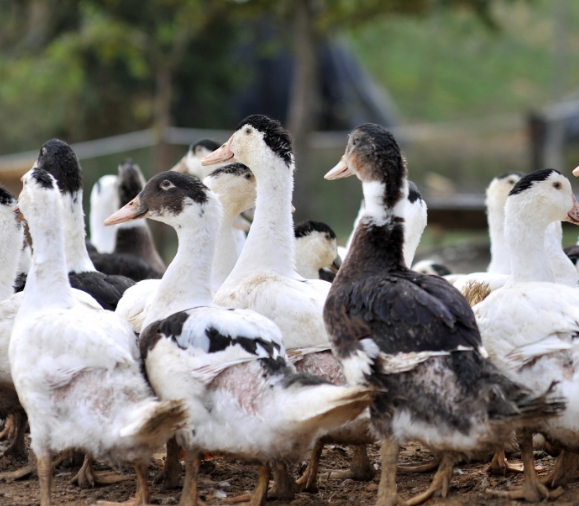
Introduction
The project involves farming game birds (duck, quail, geese, guinea fowl) for meat production to serve export markets in the USA, Europe and Asia.
The commercial case rests on Lesotho’s competitive tax and labour offer, the skills of its mainly rural workforce and the tariff-free access that Lesotho enjoys as a Least Developed Country to the USA under the African Growth and Opportunity Act, to the EU under the EU/SADC EPA, and other major markets under the Generalised System of Preferences.
Convenient
export to neighboring
markets in the
SADC region.
Strengths &
Opportunities
Globally, the commercial production of game birds is a large and growing business. Apart from the sporting side, the demand for game bird meat for health reasons is increasing.
have been recorded over the last 100 years in Lesotho.
Lesotho is still a mainly agrarian society – 70% of the population live in rural areas, of whom 55% have farming skills. While Lesotho may be new to commercial game bird farming, many households keep poultry, providing a good basis on which to train the workforce. Labour is very competitively priced, especially compared with South Africa, and the literacy rate is over 76%.
OF THE POPULATION
LIVE IN RURAL AREAS
in the agriculture and agro-processing sectors and there is no tax on dividends.
Even though Lesotho does not have the sort of commercial feed-lots used in intensive animal production, it is a grain producer and could attract animal feed manufacturers to invest in Lesotho to supply the growing markets for birds and other animals.
Lesotho’s proximity to South Africa may assist it to grow its stock of game birds and introduce new commercially viable breeds. The incorporation of modern technological and training methods will further enhance its breeding stock while maintaining quality and standards.

Markets
Lesotho’s membership of SADC and SACU allows Lesotho to export deciduous fruit to SADC countries without being subject to quotas or tariffs. The estimated market size is 300 million consumers. Lesotho’s geographical position and good road connections with South Africa permit short lead times and reasonable costs to transport produce from the Maseru area to Johannesburg, Cape Town and Durban (the port of dispatch for exports by sea). Lesotho has already trialled the export of fruit to South Africa to supply supermarket chains, with encouraging results.
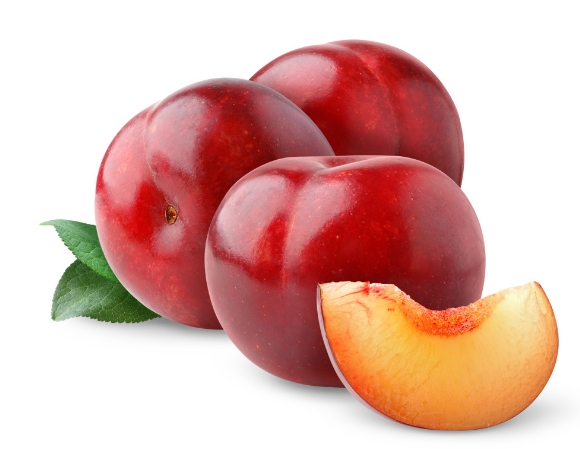
Apricots and peaches are AGOA-eligible, so they can be exported to the USA, provided that US health standards are met. That potentially opens up a market of 300 million consumers. Apples, apricots, peaches and plums may also be exported tariff-free to the EU under the EU/SADC EPA, again subject to compliance with relevant standards. The 27 EU member states have a population of around 450 million.
Beyond those markets Lesotho could also exploit its trade preferences under the Generalized System of Preferences to export to countries such as China, Japan, Australia, Canada and Turkey.
Fiscal Incentives
Corporate tax: 10% on profits from sales of agricultural goods produced in Lesotho Training: Cost of Lesotho citizens allowable at 125% for tax purposes
Withholding tax:
- 10% on service contracts with non-residents
- 25% on dividends distributed from income by resident companies to non-resident shareholders
- No withholding tax on dividends distributed to Lesotho residents
VAT:
- 15% on goods and services sold in Lesotho
- 0% on direct exports
Risk guarantees:
- Partial credit guarantee through the LNDC
- Tailor-made, agriculture-specific loan through the Post Bank of Lesotho
Specific incentives for the horticulture sector:
- Access to a Sesotho language technical training manual for local workers in on-farm and crop management
- Access to demonstration and crop pilot plots
- Facilitation support to identify and mobilize village level farmer engagement
- Access to technical data on historical crop performance
Support from the LNDC includes:
- Serviced industrial and commercial sites at competitive rentals
- Provision of industrial and commercial buildings at competitive rentals
- Financial assistance on a selective basis
- Investment facilitation services
- Assistance with permits and licenses
- Assistance with company registration
- Assistance with industrial relations issues
- Appraisal of investment projects
- Assistance with preparation of project briefs for the Environment Impact Assessment (EIA) Certification
The project would align with SDGs 1, 2, 8, 9, 10 and 15.
Financial Analysis

Whilst the NPV and IRR of the project appear to be positive, the initial investment cost of the project is only expected to be recovered in the eleventh year. The investment opportunity however responds favourably to the country’s developmental objectives through its positive socio-economic impact in terms of employment creation and potential forex earning opportunities.
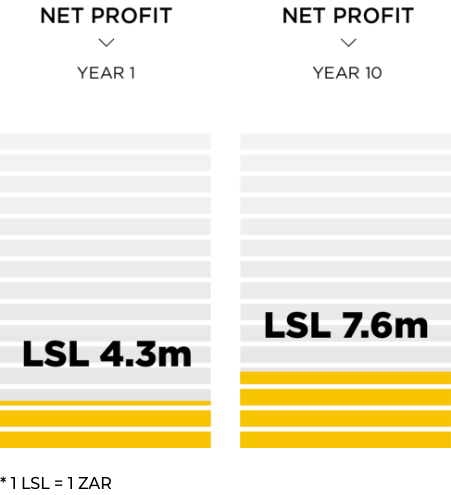
Financial Analysis
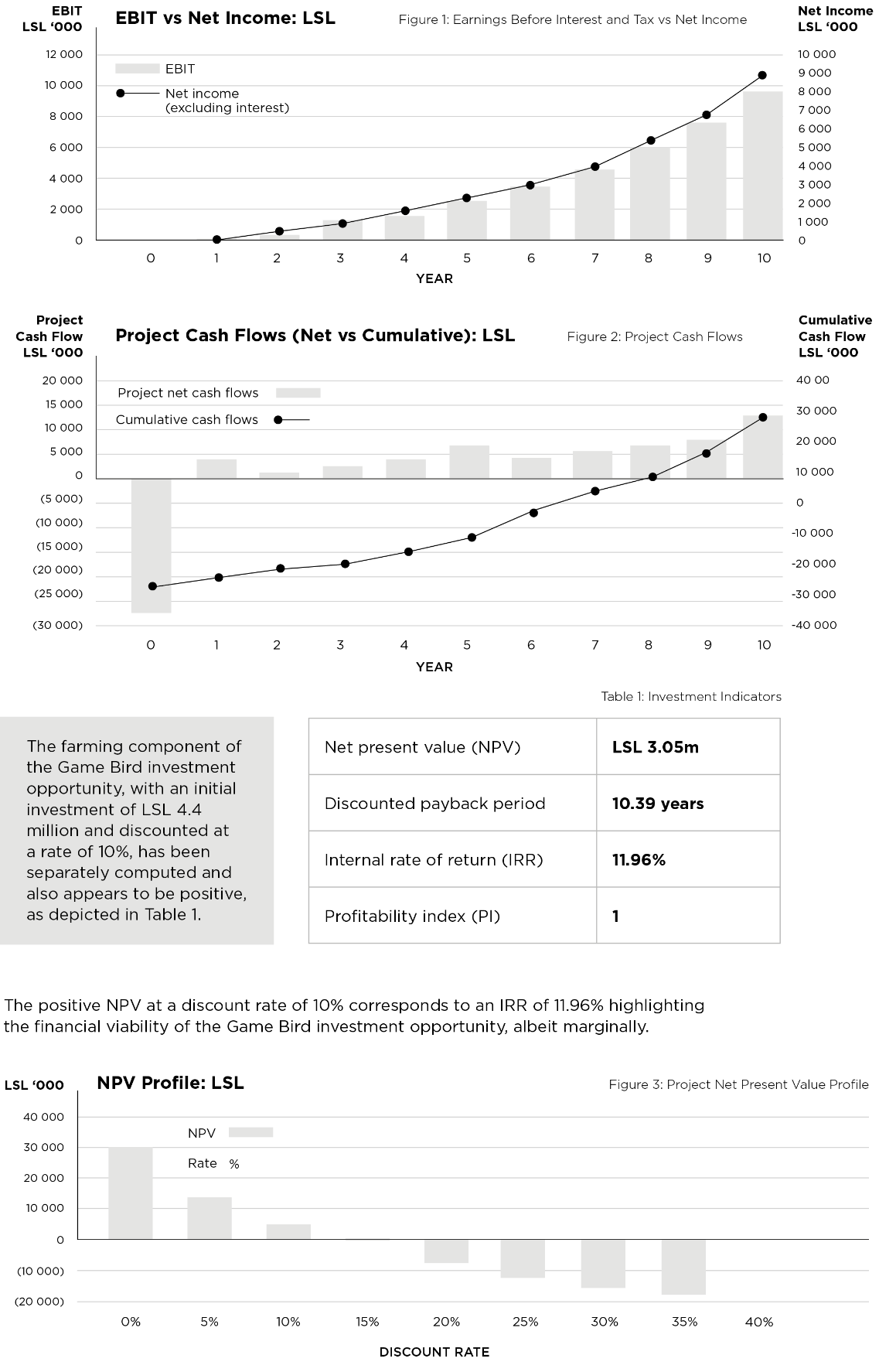
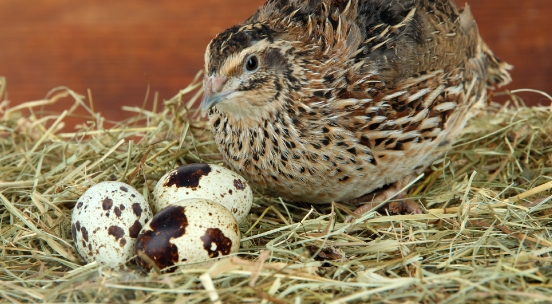
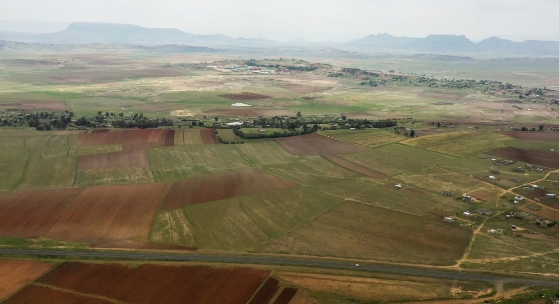
The financial analysis of the Game Bird investment opportunity is computed over a ten-year period and is limited to the processing component of the project. Revenue and expenditure projections are in line with industry growth prospects and market potential and have been informed by and benchmarked against industry standards and norms. In addition, assumptions relating to inflation; depreciation and salvage value; and company tax, have been worked out based on the existing laws and directives of the country. The figures above represent high level estimates as of January 2021 and are not derived from a full feasibility study. Investors are advised to conduct their own due diligence. There are no suitable commercial abattoirs, breeding stock or hatcheries. There is a lack of veterinary facilities and qualified professionals in Lesotho who can offer these services to the game bird industry. Regulations and standards for farming game birds are absent in Lesotho.
MS. PHOMOTSO MAJODINA
General Manager (a.i)
Investment and Trade Promotion Unit
Lesotho National Development Corporation
Email: [email protected]
MS. MAMPHAPHATHI MOLAPO
Officer: Investment Promotion, Agriculture
Lesotho National Development Corporation
Email: [email protected]
MS. MPHO MAPHIKA
Officer: Investment Promotion, Agriculture
Lesotho National Development Corporation
Email: [email protected]
